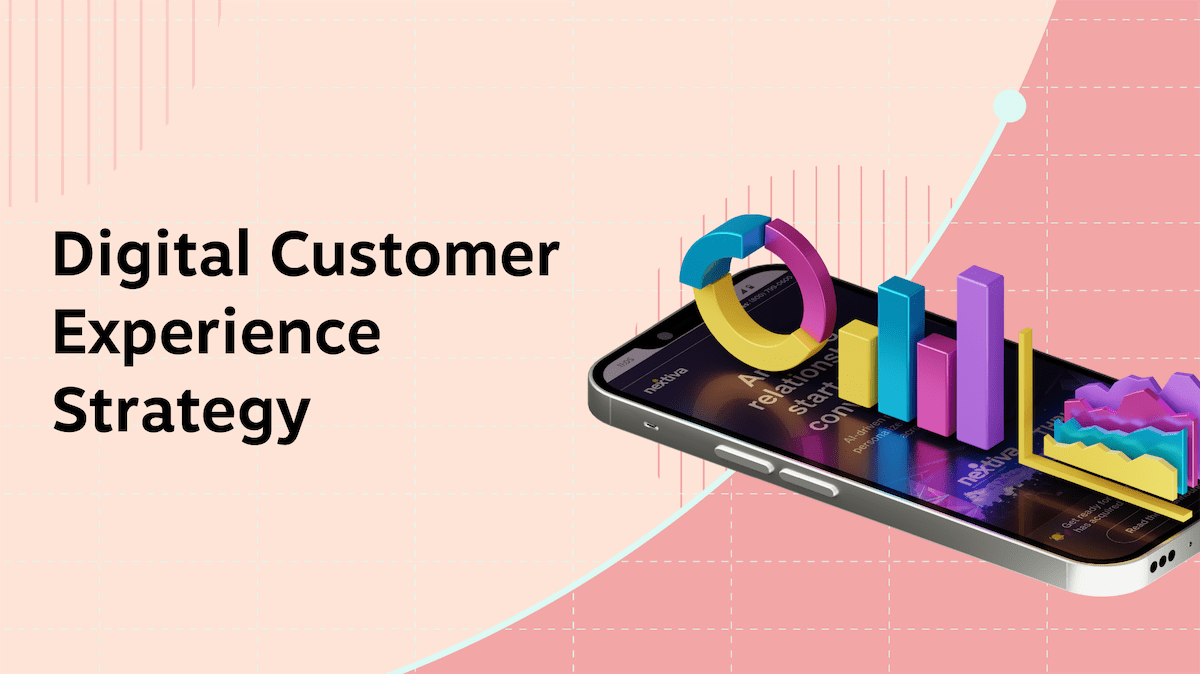Imagine that you’re shopping online for new headphones. You find the perfect pair — great reviews, good price, and just what you were looking for. So you place your order. But a couple days later, you get an email: There’s a delay with your order.
If the company doesn’t have a good strategy in place, they may just send you a vague, impersonal email with no explanation or compensation offer. Or, worse, they won’t send you any correspondence at all.
A positive customer experience fuels customer loyalty, while a negative one can cause your customers to go to another brand.
Here are six ways to make your brand stand out and keep your customers happy.
Take the AI Maturity Assessment
In just 5 minutes, get your personalized score and recommendations to move forward with AI.
Why Does a Digital Customer Service Strategy Matter?
Digital customer service (DCS) is the support you provide to customers through online touchpoints—anywhere they connect with your business in the digital space. This can include:
- Live chat or chatbots
- Messaging apps and push notifications (SMS, WhatsApp, WeChat, mobile apps)
- Online communities or forums
- Contact or inquiry forms
- Social media platforms
- Video chats
- FAQ pages, knowledge bases, or help desks
But simply offering these channels isn’t enough to guarantee a great customer experience. You need a solid strategy in place.
A digital customer experience strategy is your plan for using them effectively—making sure you answer questions quickly, solve problems smoothly, and create a positive, consistent experience every time.
A strong DCX strategy matters because it:
- Boosts customer satisfaction – Creates smoother, more enjoyable interactions.
- Increases loyalty and retention – Keeps customers coming back.
- Drives higher revenue – Satisfied customers spend more and buy more often.
- Improves brand reputation – Positive experiences encourage recommendations and reviews.
- Provides valuable insights – Data from each customer interaction guides better business decisions.
- Enhances efficiency – Streamlines processes through automation and optimized touchpoints.
- Gives a competitive edge – Differentiates your brand in crowded markets.
How to Improve Your Digital Customer Experience Strategy
As you can see, embracing digital transformation can bring you plenty of benefits. To avoid the pitfalls and enjoy its advantages, here are six ways to improve your digital CX strategy.
1. Personalize every interaction
Customers expect experiences that feel tailor-made for them. Personalizing every interaction means using the right customer data to understand and anticipate their needs—so they feel valued at every touchpoint. And when they feel valued, they’ll engage more with your brand.
Analyze browsing behavior, purchase history, and engagement patterns to uncover what your customers want and how they interact with your brand.
For example, if you request a phone number and email, ask your customers what their preferred way of communication is. Then, make sure you respect their answers. So don’t call if they say they prefer to be contacted through email.
AI tools can predict what a customer is likely to need next—whether it’s a product, service, or piece of content. Deliver targeted recommendations, special offers, or timely messages that align with their preferences.
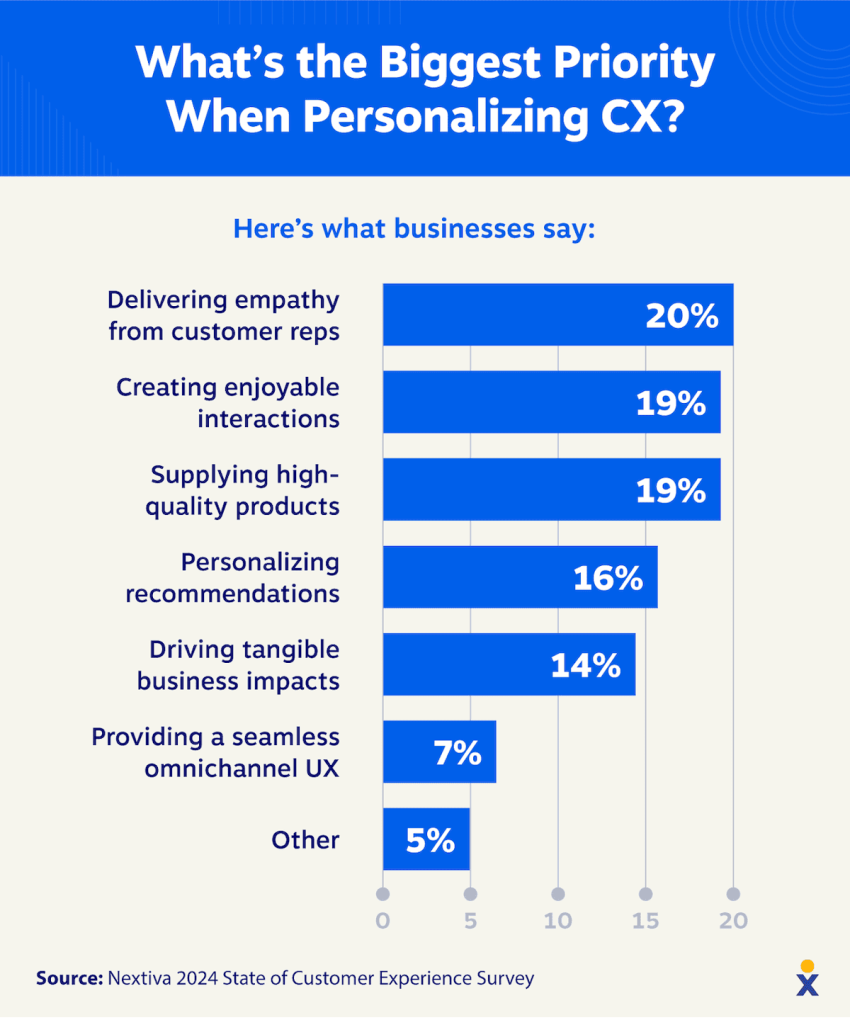
For example, if a customer has recently viewed several products on your website but hasn’t made a purchase, you can send them a targeted email with a special offer on those specific products. Or you can provide additional information that may help them in their decision-making process.
Think of how Netflix suggests shows based on your viewing history, or how Amazon’s “You might also like…” feature guides you toward products you’re most likely to buy. These strategies build trust, increase engagement, and keep customers coming back.
2. Optimize your website and mobile experience
Your website is often the first impression customers have of your brand, and in a mobile-first world, it needs to perform flawlessly on every device. Optimizing your website and mobile experience ensures that visitors can find what they need quickly and enjoy every interaction on your site.
Be sure to prioritize speed and navigation because a slow or confusing site drives customers away. Improve load times, organize menus logically, and provide an intuitive search function so users can reach their goal in just a few clicks.
Don’t forget to focus on mobile usability. More customers browse and shop on smartphones than ever before. A mobile-first design—optimized layouts, clear CTAs, and touch-friendly navigation (large buttons, more white space, etc.)—keeps their journey smooth and frustration-free.
And, finally, include accessibility features on your website. An inclusive digital experience means everyone can interact with your brand. Add screen reader compatibility, descriptive alt text, and high-contrast design options to meet accessibility standards and serve all users.

3. Streamline omnichannel communication
Customers expect consistent, connected interactions—no matter how or where they reach out. Streamlining omnichannel communication means uniting all your customer touchpoints into one seamless experience.
Whether a customer contacts you via live chat, social media, email, or phone, the tone, branding, and quality of service should feel the same. Consistency builds trust and reinforces your brand identity.

Equally as important is a central CRM or customer platform to keep all interaction history in one place. This allows your team to provide personalized, informed responses without asking customers to repeat themselves—which is the best way to frustrate a customer fast!
For example, let’s say a customer starts a support chat on your website but later switches to email—your team can easily continue the conversation right where it left off. No lost context, no frustration.
Challenges in managing customer journeys across every digital channel
While delivering a smooth, omnichannel experience sounds great in theory, there are plenty of challenges businesses face along the way. Customers expect to start a task on your website, pick it up in your app, then maybe finish it by speaking with an agent, all without missing a beat or repeating themselves.
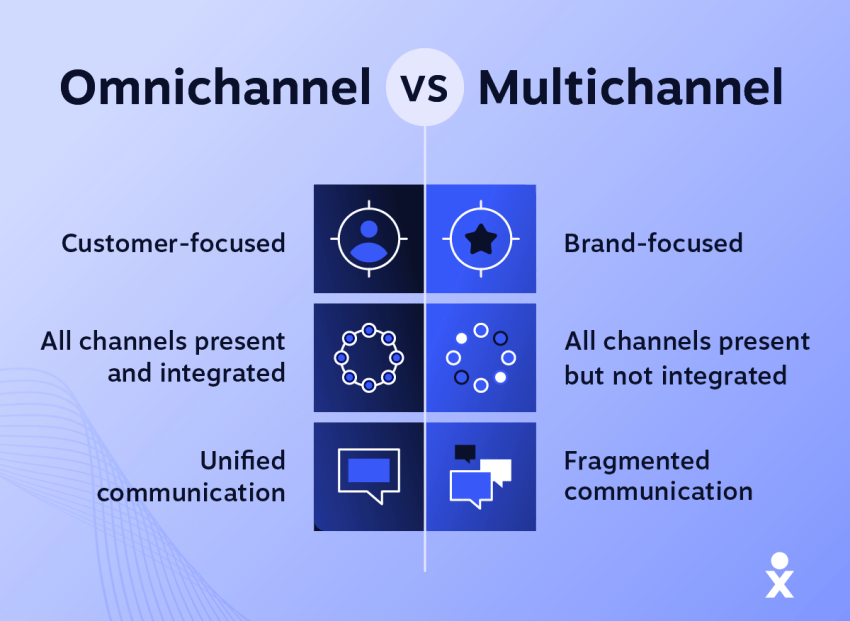
Keeping that journey consistent and frustration-free is easier said than done.
So, what gets in the way? Here are some of the top hurdles:
- Siloed data: When customer information lives in separate systems, agents lack context, leading to repetitive questions and slower support.
- Channel explosion: With new channels popping up every year (think WhatsApp, Instagram, third-party marketplaces), it’s tough to keep the experience consistent everywhere.
- Lack of integration: Juggling multiple platforms—especially when they don’t talk to each other—makes stitching together the customer journey a headache.
- Operational complexity: Managing teams, training agents on new channels, and keeping service levels high everywhere spreads resources thin.
- Changing customer expectations: As technology evolves, so do customer standards. What wowed people yesterday is table stakes today.
Closing these gaps means businesses need to break down data silos, invest in flexible tools, and keep the customer’s needs at the center—no matter where or how they reach out.
4. Leverage automation without losing the human touch
Automation can make your customer service faster and more efficient, but it should never feel cold or impersonal. The best digital customer experience strategies balance automation with genuine human connection.
Use chatbots, automated emails, and self-service tools to handle common requests like order tracking, password resets, and appointment reminders. This frees your team to focus on more complex, high-value interactions.
And keep in mind that even automated responses should sound friendly and on-brand. Use conversational language, personalized details, and empathy to make customers feel valued.
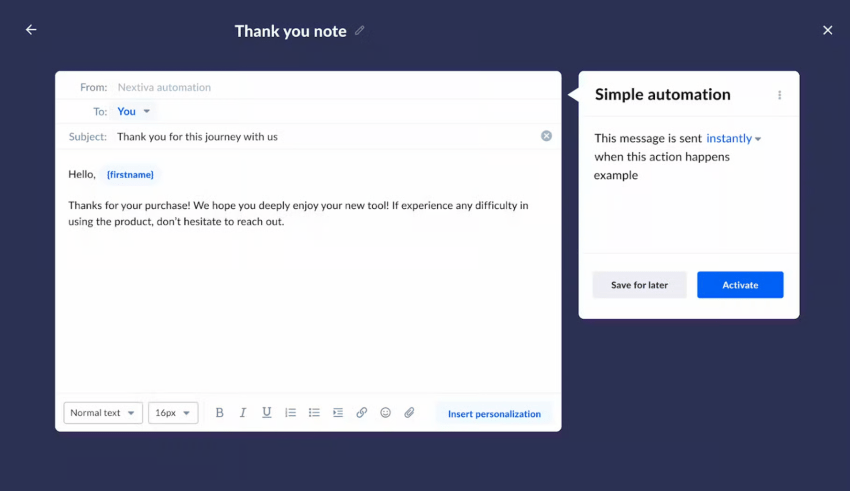
But always offer an easy human escalation option. Customers should be able to connect with a live representative at any point to prevent them from feeling frustrated and bouncing from your site. Including clear “speak to an agent” buttons will prevent this frustration and keep trust intact.
5. Collect and act on customer feedback
Customer feedback is a goldmine for improving your DCX strategy. Use insights from surveys, reviews, call recordings, and analytics to personalize interactions, spot service gaps, and measure performance.
Adopt a data-first mindset—make feedback central to decision-making. If customers want faster response times, streamline communication. If many ask how to use a feature, create guides or video tutorials to address it.
Review support interactions regularly and provide your team with actionable coaching. Encourage agents to send feedback forms at the end of conversations, then analyze results to identify trends and opportunities for improvement.
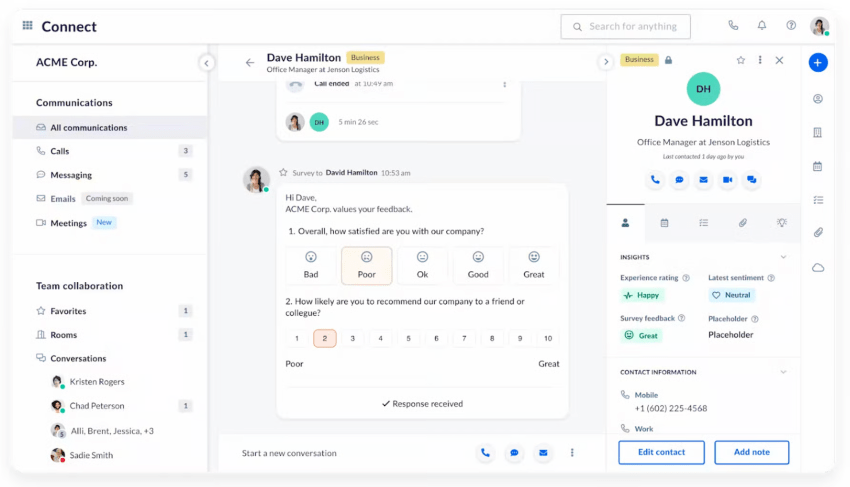
6. Be proactive in your customer support
Don’t wait for customers to come to you with questions—anticipate their needs and address them first. Use digital customer service tools to deliver proactive updates that keep them informed and reassured.
For example, instead of waiting for a customer to ask about their order, send daily progress updates. If a delay occurs, notify them immediately, explain the reason, and offer solutions before they have to reach out.
Tools like Nextiva, Zendesk, Intercom, and Freshdesk allow you to automate updates, send proactive notifications, and maintain seamless communication across channels. You can also use order tracking platforms like AfterShip, proactive messaging tools like Twilio, and social monitoring solutions like Sprout Social to stay ahead of customer needs.
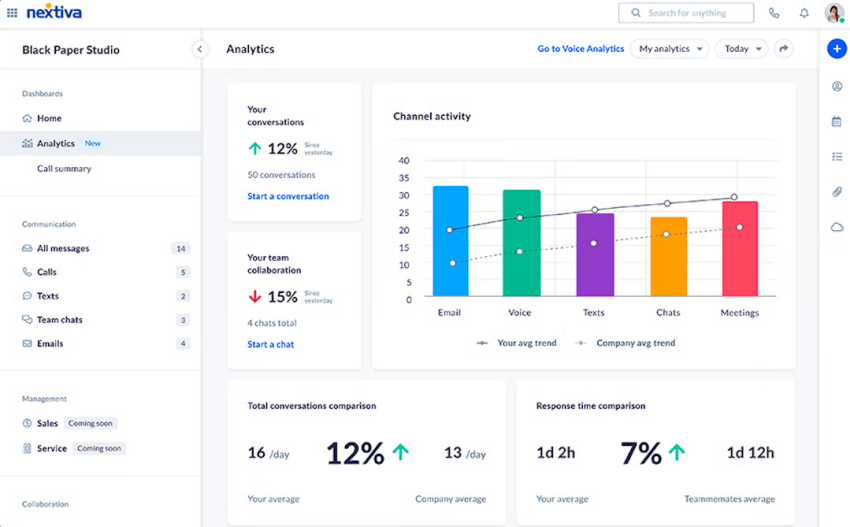
Proactive communication shows customers you value their time and care about their experience. It builds trust, reduces inbound queries, and helps prevent frustration before it starts.
It also allows you to identify and nurture loyal customers—the ones most likely to keep doing business with you and share positive reviews—while minimizing the risk of churn.
Best Practices for Improving the Digital Customer Experience
While specific strategies help you optimize certain touchpoints, following a set of best practices ensures that your digital customer experience stays strong across every interaction.
These principles create the foundation for long-term success:
- Monitor performance regularly: Track metrics like response time, resolution rate, and customer satisfaction score to spot trends and areas for improvement.
- Invest in ongoing training: Equip—and train—your team with the latest digital tools, communication techniques, and customer service best practices.
- Maintain a consistent brand voice: Make sure messaging feels unified across all channels, whether it’s live chat, social media, or email.
- Keep self-service resources fresh: Update FAQs, knowledge bases, and tutorials regularly so customers can find accurate, up-to-date information and help.
- Test and refine new tools: Pilot new features or software with a small group before rolling out company-wide to ensure smooth adoption.
- Stay customer-centric: Make every decision with the customer’s needs and preferences in mind.
By combining these best practices with the six strategies above, you can deliver a consistent, high-quality digital experience that builds brand loyalty and long-term growth.
Enhance Your Digital Customer Experience Strategy with Nextiva
Improving your digital customer experience strategy isn’t about one big change—it’s about consistently refining every interaction.
By focusing on and improving these six areas, you can create a seamless, engaging, and loyalty-building experience across each digital touchpoint:
- Personalize every interaction to make customers feel understood and valued.
- Optimize your website and mobile experience for speed, usability, and accessibility.
- Streamline omnichannel communication so customers enjoy consistent service anywhere they connect.
- Leverage automation without losing the human touch to deliver speed and empathy together.
- Collect and act on customer feedback to make informed, customer-driven improvements.
- Be proactive in your customer support to anticipate needs and prevent issues before they happen.
When you apply these strategies, you’re not just meeting customer expectations—you’re exceeding them. That’s how you build trust, boost satisfaction, and create lasting relationships that grow your brand.
Nextiva steps in to offer exactly that.
Our comprehensive CXM platform integrates all your customer interactions in one place, ensuring that everyone gets the attention they deserve. With Nextiva’s contact center, you’re equipped to lead the way in customer experience, staying ahead of the curve in meeting and surpassing the customer expectation.
Create an amazing customer experience.
Customer expectations have changed. Engage on every channel with Nextiva’s unified communications platform for the best customer experience.
Digital Customer Experience Strategy FAQs
Start by pairing experience data (like CSAT scores, feedback, and comments) with operational data (such as site analytics and purchase patterns) to understand both what customers do and why.
Map and analyze key customer journeys—checkout, onboarding, first logins—to spot friction points.
Get laser-focused on your audience by gathering feedback from your actual target group across all channels they use and looking for patterns in their frustrations and needs.
Make giving feedback a breeze by offering quick, low-friction tools like star ratings, thumbs up/down buttons, or a persistent feedback tab.
Finally, track the metrics that matter most and act on insights to improve satisfaction, loyalty, and long-term growth.
To truly understand how well your digital customer experience strategy is working, you’ll want to keep a close eye on several key metrics, such as:
Customer Satisfaction Score (CSAT): Direct feedback from customers about their experience, usually gathered through quick surveys at the end of an interaction.
Net Promoter Score (NPS): Measures the likelihood that customers would recommend your business to others—a solid indicator of loyalty and advocacy.
Customer Effort Score (CES): Tells you how easy it was for your customer to get their issue resolved, revealing friction points in the journey.
First Contact Resolution (FCR): Shows whether customer issues are being addressed in one go, saving time for both parties.
Response and Resolution Times: Tracks how quickly you answer and solve customer questions—speed still matters.
Repeat Visit Rate: Identifies how often customers return to your digital channels, suggesting satisfaction and engagement.
Churn Rate and Customer Retention: Monitors how many customers stay versus how many leave after interacting with your brand.
When it’s time to choose a digital platform, the sheer number of options can make your head spin. But amid all the bells and whistles, a few key features stand out as must-haves:
Live, Actionable Analytics: Your DXP should offer clear, real-time insights at both the big-picture and fine-detail levels. Dashboards that summarize trends and let you drill down into specifics help your team stay proactive.
Customizable User Roles: Look for systems that allow you to set different permissions, so each team member can focus on what’s relevant to their job, keeping sensitive data protected and user experience streamlined.
Smart Automation: Automated workflows, like ticket routing or triggering alerts when certain actions occur, ensure that nothing falls through the cracks.
Predictive Tools: The ability to forecast trends or customer behaviors is the secret sauce for staying ahead. Predictive analytics let you simulate different strategies, measure the potential impact, and adjust before you act.
Seamless Integrations: If your platform can’t “play nice” with your CRM, support tools, or website, you’ll end up with more headaches than help. Make sure integration with your existing tech stack is smooth and flexible.
Reliable Support: A feature-rich platform won’t help much if you’re stranded when issues pop up. Prioritize vendors who back up their solutions with responsive, knowledgeable support.
All-in-One Functionality: Aim for a DXP that brings everything together, allowing your customer service team to operate efficiently whether you’re a startup in Austin or a global company with hubs everywhere.
Yes, Nextiva is considered a DXP, specifically a Unified Customer Experience Management (UCXM) platform. It focuses on unifying communication channels, such as voice, chat, SMS, email, and social media, to provide a holistic view of the digital customer journey. This allows businesses to deliver a consistent and personalized experience, manage customer interactions effectively, and gain insights through analytics.


















 Customer Experience
Customer Experience 

